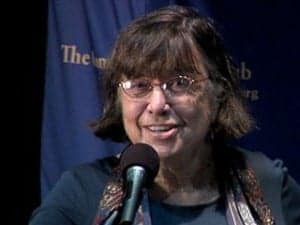In honor of International Women’s Day (March 8), we profile Mary Houghton, Vice Chair of the Stichting to Promote Women’s World Banking Board of Trustees. Mary has dedicated her career to serving low-income populations in the US and continues to support these efforts through her governance role at Women’s World Banking.

As a woman and as a banker who was focused on serving the excluded, Mary was unique in the financial services industry and remains to be a strong advocate of financial inclusion both internationally and domestically. She is credited with transforming underserved urban neighborhoods into sustainable communities and advising and inspiring similar community banking programs worldwide. Mary and ShoreBank are recognized as the inspiration for the Community Development Financial Institution industry which has invested approximately $2 trillion to revitalize urban communities in the United States since 1992.
Mary’s accomplishments are impressive: at ShoreBank, Mary was the Senior Lender and Senior Operating Officer of the South Shore Bank in Chicago. She was a co-founder of two nonprofit organizations in Chicago formed to meet the economic needs of low and moderate women. She is a director of Citizens Bank, a commercial bank owned by Vancity Credit Union in Vancouver, British Columbia and a director of Basix, a holding company in Hyderabad, India and two of its subsidiaries, all of which operate to support asset accumulation and enterprise. She is Vice Chair of Women’s World Banking and a director of the Grassroots Business Fund in Washington, D.C. In 1987, Mary helped develop ShoreBank International, Ltd. (SBI), in 1987. With consultants in over 40 countries in Asia, Africa, and the former Soviet Union, ShoreBank International is assisting financial institutions with financing small entrepreneurs to build strong and healthy economies. In 2003 she led the formation of ShoreCap Management Company and the launch of ShoreCap International, a $28.3 million equity fund which invests in financial institutions in developing countries around the world. Her degrees were an M.A. in international studies from Johns Hopkins University and a B.A. cum laude from Marquette University.
Below in this exclusive conversation with Anjali Banthia from , Women’s World Banking , Mary Houghton reflects on her relationship with Women’s World Banking and thoughts on what makes a good leader in the financial services industry. Below is an edited transcript of the interview.
Anjali: You’ve had a long relationship with Women’s World Banking. What led you to start and maintain this relationship?
Mary: There were conversations between Women’s World Banking and ShoreBank, which I was a founder of, right before Women’s World Banking’s inception in the 1970s. I went to some of the initial meetings. However, in the 80s and early 90s, I had virtually no interaction with the organization. When I reconnected in the 90s, I was inspired to join because of the roles of women and microcredit organizations and I also thought the structure of the organization – with the affiliates on the Board – was a very smart business model. It makes it possible for the institution to be very connected to the work on the ground.
Anjali: What are a few things now that you think financial institutions in developing countries need to focus on?
Mary: You can see signs that institutions are waking up to the realization that the non-affluent in developing countries need banking systems. There is this growing understandingbecause microfinance systems have been so successful. People who work in banking are risk-averse and there’s a lot of class discrimination that goes on. I don’t think you can assume that the conventional banking system is going to actively want to serve poor people. If you look at US market, [the banking industry] reaches a large number of people with simple accounts, but doesn’t want to deal with people with loans. It doesn’t want to deal with young businesses and those who do not have the same class background as the bankers. The system will change but there will always be impediments to delivering capital to less affluent markets.
Anjali: How do we change that/bridge that gap?
Mary: I don’t know the full answer to that question. Women’s World Banking is now deeply involved with savings and insurance products and deeply involved with those markets. You can run a profitable business in any of those categories –it may not be as profitable, because transaction size will be smaller but technology is changing this a lot. A lot depends on whether you are a short term or long-term thinker. It is important not to fall into the trap of discrediting the fact that you are making an acceptable (if not large) profit and serving a long-term social need. Whether or not an institution pursues an approach to broaden financial inclusion or not also comes down to having the right shareholders who share your ideas and expectations.
Anjali: You are emphasizing the role of leadership. What do you think are some of the characteristics of good leadership, particularly in this industry?
Mary: I don’t know that it’s that much different than leadership generally. Leaders need to be able to recruit and retain talented people, be able to delegate responsibility to talented people and have a vision for the organization that is inspirational. One great lesson that we had from ShoreBank was in team management. Early at ShoreBank, we were able to hire a large number of very high-energy, capable people who were great at what they did, but were often kind of like cowboys – they wanted to run their own departments without collaborating with their peers. Later, we hired some team players who better understood the need to focus on the organization as a whole, the value in being generous. This is crucial. People management and people skills are critical. I should have also mentioned technical skills, but I would imagine that they built these out in their earlier roles. These people skills need to extend downwards; not just concentrated among the top people.
Anjali: Speaking of good leaders, is there a particular mentor or leader who particularly inspired or empowered you?
Mary: Not really. With ShoreBank, our idea was to buy a bank in Chicago and use the bank as a vehicle to attract outside resources (and provide its own resources) in investing in its market, which had recently changed from white to black. We eventually grew to quite a substantial holding company that operated throughout the US. ShoreBankwas started by four people including me – two of us were white and two were black. We worked together for 25 years. So my mentor was the fact that it was a team, and a bi-racial team, that played off our different strengths to become a very successful company. It is hard for me to call out one mentor when I learned so much from being part of such a strong team. I was very lucky to have such close working relationships bi-racially in this country. I think I learned a lot about race issues in the U.S. market. I learned a lot about inequality in this country from this team and how different people do different things. We would have failed without that combination of people.
Anjali: ShoreBank has a reputation as being an early innovator in the industry. How did you encourage your team to think of themselves as innovators in this space?
Mary: No one needed to be encouraged. They came to ShoreBank because they wanted to work in this space and not for a conventional banking institution. At its peak, ShoreBank had about $2.5 billion in assets, which was impressive but still very small in this country. If you wanted to be extremely successful, you didn’t come to ShoreBank. But if you are interested in social issues and doing something meaningful, you came to ShoreBank.
Anjali: What are you working on right now? What is your current focus?
Mary: I’m on the board of BASIX [in India] and a couple of its subsidiaries in India; a bank owned by VanCity Credit Union; also Women’s World Banking and three or four other boards, mostly international. The two projects that I’m working on are both U.S.-focused: one on the potential for U.S. banks to be long-term thinkers on both social and environmental issues; the other is that in the U.S., bank loans to African American businesses have really plummeted, and I’m interested in looking at what we can do to address this.
Anjali: We’ve learned a lot today about what inspires you as a leader. But I’d also like to know more about the woman behind the accomplishments. What do you like to do for fun?
Mary: I’m really a Chicagoan. I live on the South Side near the University of Chicago campus. It was a choice to live in integrated environment and I really enjoy that. I also have a summer cottage in Wisconsin, where I like to spend time. I stay in close touch with all of the people who were running ShoreBank. ShoreBank was closed in 2010, but its affiliated companies are doing great. There’s a CDFI association – essentially, loan funds, equivalency of an MFI trade association – when they met a month or so ago in Denver, about 28 managers from ShoreBank were all meeting together there and I stay very connected to this. Community is very important to me as is my “work family” and that is what I focus on these days.
Anjali: Thank you very much for taking the time to speak with me today. I know that the readers of this blog will be very interested in hearing your perspectives on leadership and financial inclusion. We wish you the best of luck in your current pursuits and hope that you will remain an advocate for financial inclusion and good leadership for many years to come.
Post Script from Ujjivan CEO, Samit Ghosh
I had the honor of first knowing Mary when I joined the board of Women’s World Banking. My banking career in Citibank started in 1975. I travelled different through many geographies & different aspects of banking before starting Ujjivan in 2005. She was a founder of Shorebank, the first community bank in 1973. She is a true pioneer like Mohammed Yunus & Ela Bahen. She has devoted her life for financial inclusion across the globe & continues to contribute to achieve the goal.





